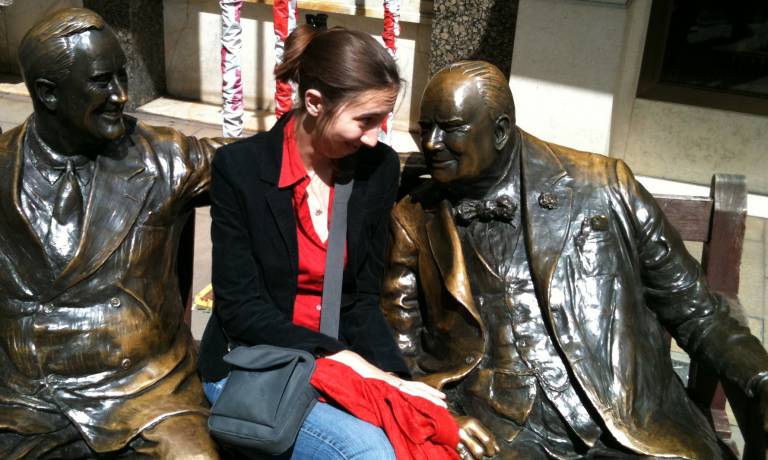Spotlight On: Sarah Wise
16 June 2017
Sarah Wise is a lecturer teaching programming and agent-based modelling, which she uses to explore questions of transportation, freight, and evacuation. Sarah is Course Director for the MSc Smart Cities and Urban Analytics programme.

Role & Project:
I lecture at CASA and serve on the FTC2050 Project, an EPSRC funded project bringing together researchers from UCL, the University of Southampton, the University of Westminster, and Lancaster University, as well as industrial partners.
How would you summarise your personal research?
I call myself a complexity scientist. When I refer to complexity, what I mean is the process by which large scale phenomena (for example, traffic on a highway) arise as a function of the behaviours of smaller-scale actors (e.g. the individual cars on that highway which are trying to exit the road at a particular exit, without colliding with one another). Understanding systems of actors in this way allows researchers to consider how differences among the actors or their behaviours translate into differences in system-level outcomes. Thus we can better understand human behaviours, cascades, the impact of limited information, coordination, the impact of space or of social ties, and many other features which of made system behaviour challenging to influence or predict.
I use agent-based models to explore movement on multimodal networks, with a particular focus on coordinated movement. For example, how can teams of police officers move around an area as they complete their responsibilities, and how visible are they to the public as they do so? I also enjoy using open geospatial data to inform my models, especially making use of OpenStreetMap data to understand how people move around cities in evacuation contexts.
Originally, I was a computer scientist, so my work typically consists of developing pieces of software which allow me to test the theories I study. Academically, I come out of a background of working in Argonne National Laboratory on agent-based modelling, studying at George Mason University's Department of Computational Social Science (now the Department of Computational and Data Sciences) and have the complexity orientation of Santa Fe Institute.
Tell us a little about the research you’re doing at the moment:
My research in the past few years has focused on modelling urban transportation and movement from the bottom up. In practice my work has ranged from exploring how agent-based modelling could help the London Metropolitan Police maximise their resources in the face of budget cuts; to writing about and simulating the multimodal nature of transportation network in cities; to helping industry freight partners in understanding what their data about vehicle movement is telling them about their current operations. I focus on understanding movement as a function of individual decisions, and how those individual decisions help to shape the environment within which others, in turn, make their own choices.
My current work with the Freight Traffic Control 2050 project exports how courier companies can change the way they deliver parcels, with the aim of decreasing road congestion and pollution while maintaining profitability. I've been able to make use of both privately owned data as well as open source data in order to gain a better understanding of the way courier companies interact and influence one another. Our hope is to work with our industry and policy partners, using our analysis to help craft better structures and patterns of working. More information is available on the project website: http://www.ftc2050.com/
In my spare time, I'm also working with Ed Manley and Friend of CASA Hitomi Nakanishi <https://scholar.google.co.uk/citations?user=IZ4VUPgAAAAJ&hl=en> to develop an evacuation model for Takamatsu, a coastal city in Japan, during a storm surge.
What is the most useful thing you’ve learned since you arrived at CASA?
That what I was originally taught in my coursework bears out in reality - it's not just the individual that matters, but the environment and system within one finds oneself making decisions. Your research group makes a huge difference to what you're able to study and work on, and being a part of a diverse group of researchers is transformational for the kind of research that you're able to do. As such, I'm grateful to be here!
The best thing about London and CASA in particular is that you can always find another person willing to geek out about what you love to study - collaboration is so entirely possible and so rewarding!
2017 Peer-reviewed publications:
Wise, S., Batty, M., and Crooks, A. (2017) Transportation in agent-based urban modelling, in Namazi Rad, M.R., Padgham, L., Perez, P., Nagel, K., and Bazzan, A. (eds.), Agent Based Modelling of Urban Systems First International Workshop, ABMUS 2016: Revised, Selected, and Invited Papers, Springer.
Chen, H., Cheng, T. and Wise, S. (2017) Developing an online cooperative police patrol routing strategy. Computers, Environment and Urban Systems. 62: 19–29. DOI: 10.1016/j.compenvurbsys.2016.10.013
2017 Talks:
Wise, S. (2017) "Visualising Last-Mile Freight Delivery (For Fun And Profit): The Freight Traffic Controller 2050 Project". Centre For Transport Studies Of Imperial College London
Where can people find out more about your work?
I have a very under-maintained blog here: http://computationalsocialscience.blogspot.co.uk
I also have a similarly sparse twitter account under the name @ComplexityWise
My GitHub: github.com/swise5/
Catch me socially out and about at a London-based Missing Maps event! http://www.missingmaps.org/events/
To see the full list of our CASA Spotlight On features, click here.
 Close
Close

